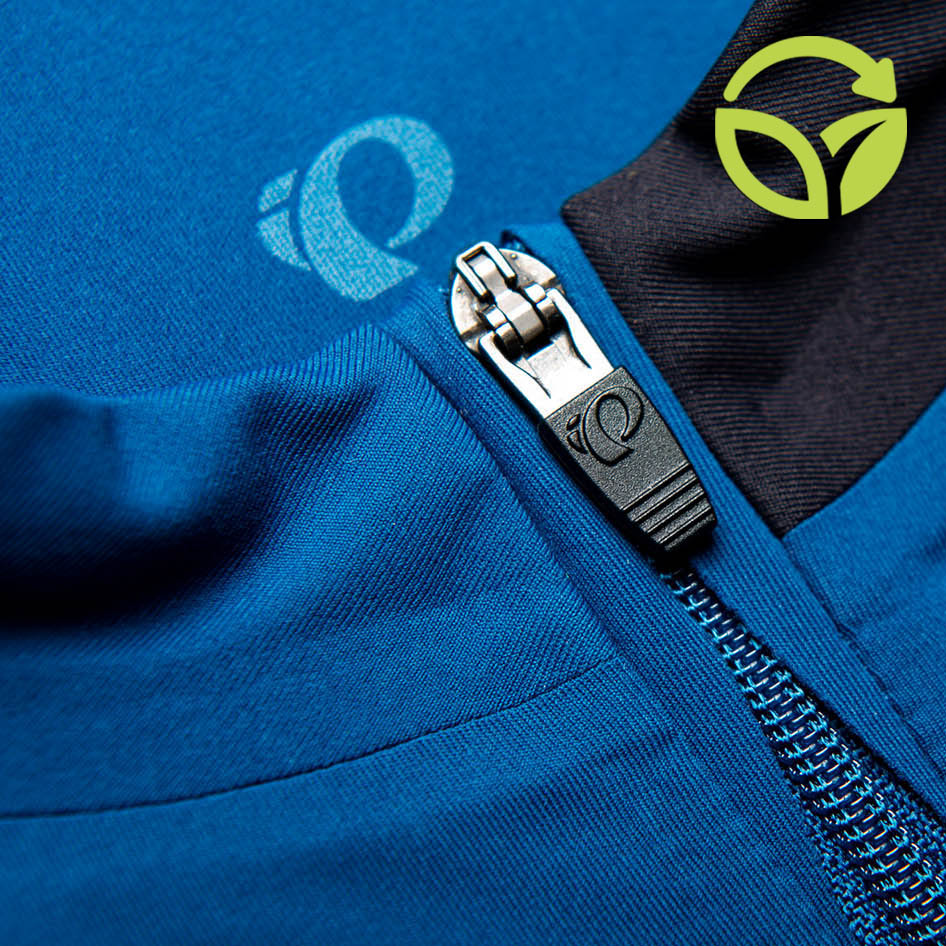By 2022, 90% of our product line will be made from recycled, renewable or organic materials. As it stands in the fall of 2018, we have only a few styles that include even a percentage of such materials. To bump that up to 90% is no small goal. To accomplish it within four years is downright audacious.
Our first major milestone on the road to 90 will be in 2020 when at minimum 30% of the complete PEARL iZUMi line will be made with recycled, renewable or organic materials. To understand how we’ll make it happen, we spoke to Michael Thompson, senior manager of product merchandising for apparel and footwear.

What are the criteria for selecting a fabric or material?
Michael: We start with the experience we want each product to deliver. That lens guides our decision making throughout the product creation process. The criteria change with each experience, but we will always be looking for the most sustainable option to meet the needs of the rider.
Which products will this initiative affect?
Michael: We’re looking at every product category and not leaving any stones unturned – from our core bib shorts to socks, hats, jerseys, footwear, and outerwear.
Can you still deliver a premium product with recycled fabrics?
Michael: Yes. We’re obsessed with quality. Period. Our standards won’t change as we make this important transition in our product line. We have less than 0.5% return rate for our product as defective. It’s something we’re very proud of and will not compromise on.
What percentage of the product line is currently recycled, renewable or organic?
Michael: The current 2018 product line only has a few styles that feature recycled, repurposed or organic material content. In the spring of 2019, the new Interval Shorts for men and women will use 100% recycled nylon material in the bib upper made from reclaimed fishing nets from the ocean. Also, all of our BikeStyle T-shirts, hats, and hoodies will be made from organic cotton and/or recycled polyester materials.
To reach the 2020 goal of using 30% recycled materials, what will be the biggest product change consumers will see?
Michael: The biggest change customers will see is a more focused line. We’re eliminating some redundancy in our product collections and offering more style, color and print variety for a wider range of riders globally. When we set out to achieve the 30% goal by 2020, we didn’t want to sacrifice product performance in any way. We won’t compromise the hand feel, fit or comfort in any of our garments to achieve this goal. These products will be identified with a “Sustainable Performance” notation.
Are there any downsides to using recycled materials?
Michael: Recycled materials cost more in general, as compared to non-recycled materials. We’re working hard to hold prices steady and still deliver on our sustainability commitment. This means we’re listening to what our customers tell us they value in a particular style, and our product and material teams are getting very creative in finding ways to keep all those elements and features of that style in place.

Why not switch to more sustainable materials all at once…right now?
Michael: Sweeping changes like this present a handful of challenges that we have to thoughtfully and carefully address. We have very high material standards at PEARL iZUMi. It takes time to test, validate and assure a new material meets our brand quality and durability standards. We want to confirm we’re sourcing the highest quality, at a fair price, and from responsible partners. Also, the product creation process is typically 18-24 months. So
What is the biggest challenge around the 2022 goal to use 90% recycled, renewable and organic materials?
Michael: Our biggest challenge is to not compromise our product in any way. It’s an exciting challenge and the team is really rallying behind this goal. Riders trust our gear and going down this new path requires us to be very diligent around performance, cost, durability, and sourcing so that our product continues to be as exceptional in every way.
How can we understand the big picture of what these changes mean? For example, how do we know that recycled materials aren’t disproportionately eating up other resources, like clean water?
Michael: We have that same concern. To address it, we’ll be performing a product life cycle assessment (LCA) to assess all the environmental impacts associated with all stages of a product’s life: from raw material extraction through materials processing, manufacturing, distribution, use, repair and maintenance, and disposal or recycling. This information will be critical to our team understanding the true impact of the changes we are making and help guide our decision making throughout the entire product creation process. We’ve also been an active participant in the HIGG index, since 2015. It’s a comprehensive assessment of our sustainability and corporate footprint
This is a really exciting time at PEARL iZUMi, and we’re taking a true leadership position with sustainability in the cycling space, something that is sorely needed and long overdue in our industry.
Couldn’t have said it better ourselves. Thanks, Michael!








Comments